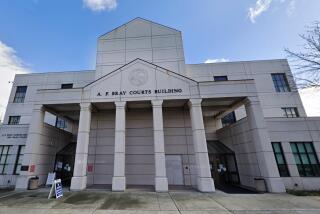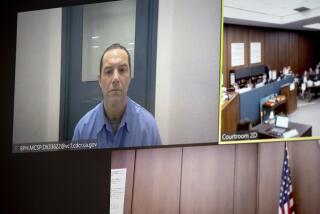Client dies in prison, but lawyer still seeks to prove innocence
A convicted killer who died on death row while his appeal languished before the California Supreme Court should have his case decided posthumously, his attorney told the state high court.
Scott F. Kauffman, who represented Dennis Lawley for 19 years, contends that his client was innocent of a 1989 murder for hire that sent him to San Quentin. Lawley, he said, deserves a ruling on his claims, even if the outcome will have no practical consequence.
“Mr. Lawley’s death does not erase the injustice of his conviction and sentence,” Kauffman told the court in a written motion. “It would be a disservice to justice and to Mr. Lawley, who has always maintained his innocence, for this court to [dismiss the case] as moot.”
Lawley was sentenced to death after he was convicted of hiring two men to kill Kenneth Stewart, a recently released prisoner who had been robbing drug dealers. Prosecutors contended that the murder weapon was a gun found in Lawley’s cabin in Modesto.
Years after Lawley’s conviction, Brian Seabourn, the admitted triggerman, said he was ordered to shoot the victim by the Aryan Brotherhood, a prison gang. Seabourn, serving a life sentence, had long confided in others that he had buried the murder weapon in a Modesto field.
A search of that field in December 2007 turned up a rusty revolver, the type of gun Seabourn had described.
The discovery came too late for an innocence case that Lawley had pending before the California Supreme Court. The court rejected that petition, ruling that Lawley had not proved his innocence, but gave him the opportunity to file a new challenge based on the gun’s discovery.
Kauffman filed the new challenge in April 2008, and written arguments were completed in January 2009.
After hearing nothing from the court for 23 months, Lawley filed another motion in December 2010 asking the court to move more quickly.
Fifteen additional months had passed when Lawley, 68, was found dead in his cell March 11, a victim of heart failure triggered by methamphetamine use. His motion asking for a speedy resolution was still pending.
Courts sometimes decide cases after they have become moot, to resolve important legal issues. But in fact-specific cases such as Lawley’s, they generally decide that their time would be spent better elsewhere.
Deputy Atty. Gen. David A. Eldridge, representing the prosecution in the case, could not be reached for comment. Kauffman said he wants “the state of California to acknowledge there was a giant miscarriage of justice”
“Mr. Lawley is dead, but his case should not be buried with him,” Kauffman told the court.
The court has not responded to his request.
More to Read
Start your day right
Sign up for Essential California for news, features and recommendations from the L.A. Times and beyond in your inbox six days a week.
You may occasionally receive promotional content from the Los Angeles Times.







